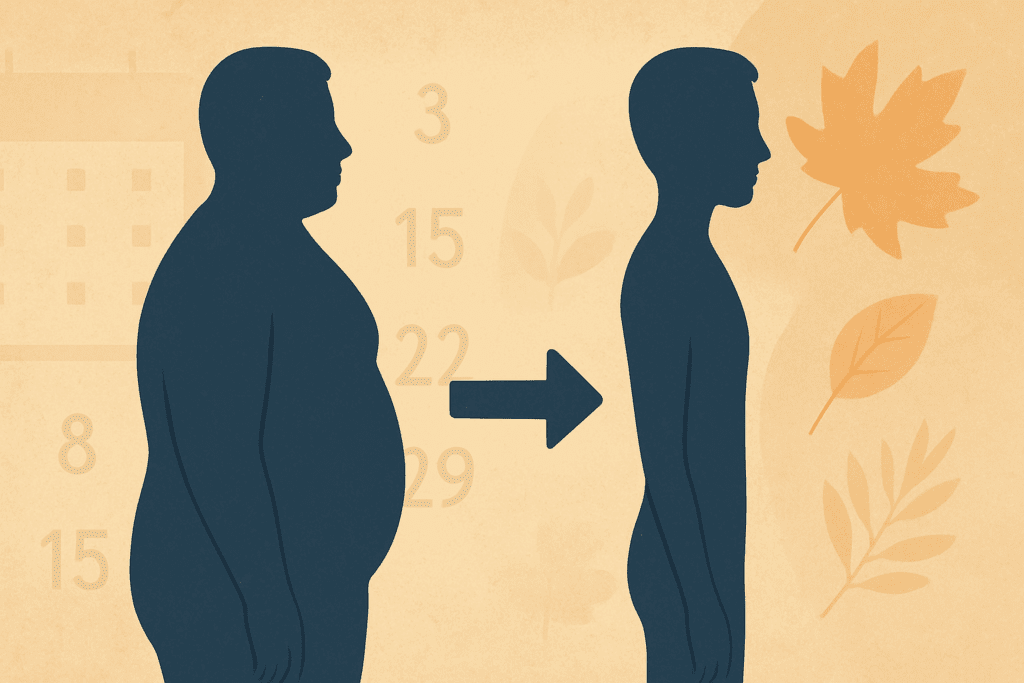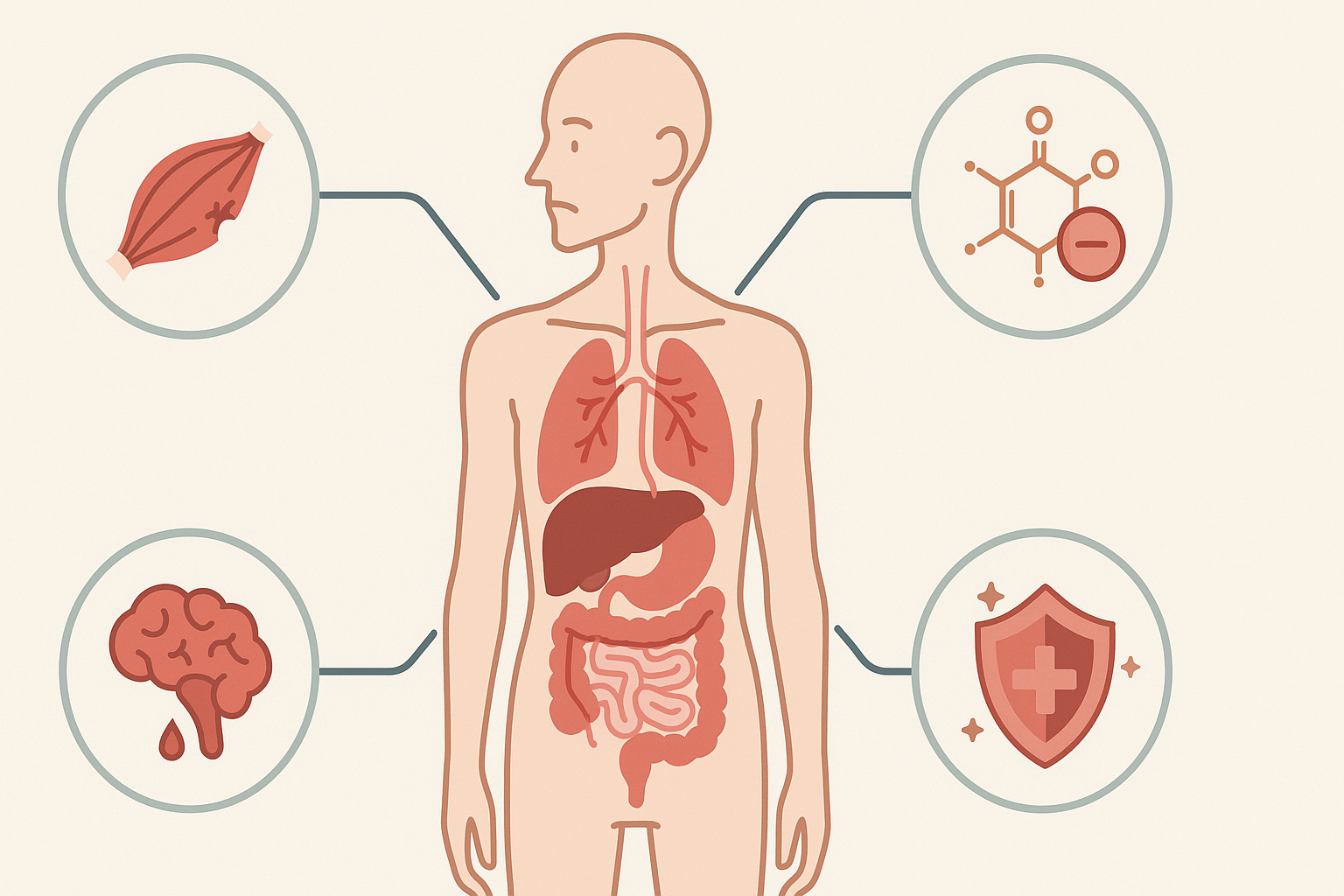In a society where weight loss is often celebrated, rapid or sudden weight loss can paradoxically signal something far more concerning than achievement. While intentional weight reduction through structured diet and exercise is a goal for many, losing weight rapidly without trying can be a red flag for underlying health issues. Understanding the difference between healthy and potentially harmful weight loss is essential, especially when it happens unexpectedly. Medical professionals are increasingly focusing on the distinction between weight loss driven by lifestyle changes and weight loss unexplained by obvious factors. This article explores what is considered rapid weight loss, unpacks the most common and lesser-known causes, and highlights when it’s time to seek medical attention. Through expert insights and medically sound evidence, we’ll examine the physiological, psychological, and pathological reasons behind losing weight too fast and how to respond wisely when it occurs.
You may also like: Expert-Backed Weight Loss Tips for a Healthier Lifestyle: What You Need to Know for Long-Term Weight Control and Wellness

Defining Rapid Weight Loss and What Is Considered Drastic
Before diving into causes and health risks, it’s important to define what is considered rapid weight loss in clinical terms. Most healthcare professionals agree that unintentional weight loss exceeding 5% of body weight within six to twelve months is a cause for concern. However, in cases where that amount of weight is lost within just a few weeks without dietary changes or exercise, it may fall under the category of what is considered drastic weight loss. For instance, if a person weighing 180 pounds suddenly loses 10 pounds in a month without trying, this is significant enough to warrant further evaluation.
Rapid weight loss can be either intentional or unintentional. Intentional weight loss typically involves calorie restriction, increased physical activity, or medically supervised plans. In contrast, unintentional weight loss refers to shedding pounds without consciously trying to do so. While intentional extreme weight loss through fad diets or aggressive fasting methods may seem effective in the short term, it can still lead to nutrient deficiencies, electrolyte imbalances, and muscle wasting. This makes it crucial to distinguish between different forms of losing weight rapidly and assess their potential risks based on context and cause.

Common Medical Conditions Behind Rapid Weight Loss
Numerous medical conditions can be linked to rapid weight loss, particularly when the weight loss is unintentional. One of the most well-known culprits is hyperthyroidism, a condition in which the thyroid gland produces excessive amounts of thyroid hormone, leading to an increased metabolism. This can cause individuals to lose weight even when their appetite remains unchanged or increases. Cancer is another critical consideration, as malignancies can accelerate metabolic rate, disrupt appetite regulation, and lead to significant weight loss.
Diabetes, particularly when undiagnosed or poorly managed, can also result in unexpected and rapid weight loss. In type 1 diabetes, for example, the body begins to break down fat and muscle to fuel itself due to the lack of insulin. This metabolic shift can lead to substantial weight reduction in a short amount of time. Additionally, gastrointestinal disorders such as celiac disease, Crohn’s disease, or peptic ulcers can impair nutrient absorption and cause weight loss unexplained by changes in eating habits. Chronic infections, including tuberculosis or HIV, may similarly induce wasting syndromes due to increased energy demands and poor nutrient utilization.

Mental Health and Behavioral Factors in Unintentional Weight Loss
Beyond physical illness, mental health plays a significant role in sudden or rapid weight loss. Depression, anxiety disorders, and eating disorders such as anorexia nervosa can all result in substantial weight changes. Often, people experiencing mental health challenges may lose their appetite, neglect meals, or engage in restrictive behaviors without fully realizing the consequences. For individuals who find themselves losing weight without trying but feel fine emotionally and physically, it is still possible that underlying stress or subclinical psychological issues are at play.
Eating disorders, in particular, may develop gradually and remain hidden under the guise of discipline or wellness. Orthorexia, though not yet formally recognized as a clinical diagnosis, describes an unhealthy obsession with clean or healthy eating, which can result in unintentional nutrient deficits and extreme weight loss. Additionally, grief, trauma, or major life changes can influence eating behavior in subtle ways. The complexity of these factors underscores the need for a holistic approach when evaluating reasons for unexplained weight loss.

What Happens If You Lose Weight Too Fast?
While weight loss may initially appear beneficial, losing weight too fast can disrupt essential bodily functions. Rapid depletion of fat stores, especially in individuals who are not overweight, can impact hormone production, immune system strength, and even cognitive function. One of the most well-documented risks involves the loss of lean muscle mass, which is critical for maintaining metabolic rate, mobility, and overall strength. This type of loss often goes unnoticed in the early stages but can lead to long-term functional impairments.
Electrolyte imbalances are another major concern. These are particularly dangerous in individuals undergoing extreme weight loss due to crash dieting or illness. Potassium, sodium, and magnesium levels can plummet quickly, leading to symptoms like dizziness, fatigue, heart palpitations, and in severe cases, cardiac arrhythmia. Moreover, gallstones—a lesser-known consequence—can form when rapid weight loss interferes with bile production and fat metabolism. These complications illustrate that even in individuals who have suddenly lost weight and feel fine, deeper metabolic disturbances may be silently developing.
Signs and Symptoms to Watch When Losing Weight Rapidly
Recognizing losing weight too fast symptoms is essential for timely intervention. Fatigue, weakness, frequent infections, changes in bowel habits, or unexpected muscle loss are all red flags that should not be ignored. Sometimes, rapid weight loss causes psychological changes as well, including irritability, insomnia, or brain fog, all of which can diminish quality of life. If these symptoms are paired with no changes in physical activity or diet, medical evaluation becomes critical.
It’s also important to look for subtle symptoms like dehydration, changes in skin texture, and hair thinning. These signs indicate that the body may not be receiving or retaining sufficient nutrients. For those losing weight without trying but feel fine on the surface, these physical markers can be the first signs of deeper problems. Monitoring body composition through methods like DEXA scans or bioelectrical impedance analysis may help reveal whether weight loss is coming from fat or lean tissue, offering valuable insight into health status.
Medication and Lifestyle-Related Causes of Unexplained Weight Loss
In some cases, rapid or unintentional weight loss may result from side effects of medications. Certain drugs, including chemotherapy agents, antidepressants, stimulants, and medications for thyroid disorders, can suppress appetite or alter metabolic rate. Additionally, long-term use of laxatives, diuretics, or over-the-counter weight loss supplements may lead to nutrient loss and fluid depletion that contributes to sudden or drastic weight reduction.
Lifestyle changes, especially increased physical activity or stress, can also play a role. Sometimes individuals unknowingly increase their caloric expenditure through activities such as walking more frequently, starting a new job with physical demands, or experiencing chronic sleep deprivation, which affects metabolism. When evaluating unintentional weight loss causes, clinicians must also consider recent life transitions, substance use, or dietary restrictions that may not have been viewed as significant by the patient but contribute to the overall picture.

The Link Between Malnutrition and Extreme Weight Loss
Malnutrition is both a cause and consequence of extreme weight loss. When the body is deprived of essential nutrients, it begins to catabolize its own tissues, including muscle and organ mass, to sustain energy needs. This state of catabolism not only accelerates weight loss but also damages cellular and immune function. Malnutrition is especially prevalent in the elderly, individuals with chronic illnesses, and those undergoing aggressive cancer treatments or surgical recovery.
In this context, it’s vital to distinguish between weight loss unexplained by behavior and weight loss resulting from neglect or limited access to food. Food insecurity, poverty, and disordered eating can all create cycles of unintentional weight loss that mask more complex underlying conditions. The relationship between nutrient absorption, gut microbiota, and energy regulation is also gaining attention as a contributing factor to losing weight rapidly, particularly when traditional explanations fall short.
When to See a Doctor About Sudden Weight Loss
Although a few pounds of weight loss over time may not be alarming, losing a substantial amount quickly—especially without effort—should prompt medical consultation. A general guideline is to seek help if more than 5% of your body weight is lost over six months without intentional changes in diet or physical activity. This threshold helps identify what is considered rapid weight loss from a clinical perspective and serves as an important indicator of possible underlying disease.
A healthcare provider will likely begin with a full medical history, lab tests, and physical examination to assess potential causes. They may also inquire about mental health, recent stressors, and changes in sleep or energy levels. Diagnostic imaging, gastrointestinal evaluations, or referrals to endocrinologists or dietitians may follow based on initial findings. Even if you have suddenly lost weight and feel fine, it is critical not to dismiss the possibility of a serious underlying condition that has not yet manifested more obvious symptoms.

Reversing the Effects and Supporting Healthy Weight Restoration
If the root cause of rapid weight loss is identified and addressed early, the effects can often be reversed through a combination of nutritional intervention, medical treatment, and lifestyle adjustments. For patients recovering from illness, a structured refeeding protocol supervised by a registered dietitian may be necessary to avoid refeeding syndrome, a potentially fatal shift in fluids and electrolytes that occurs when nutrition is reintroduced too quickly. For others, addressing digestive disorders, restoring thyroid function, or managing mental health conditions can support sustainable recovery.
Muscle recovery and strength training are essential components of reversing extreme weight loss. Resistance exercises combined with adequate protein intake help restore lean mass, improve metabolic function, and enhance quality of life. Regular monitoring by a healthcare provider can track progress, ensure safety, and provide reassurance. In cases of losing weight too fast symptoms that persist despite treatment, additional diagnostic work may be required to uncover less common conditions such as autoimmune disorders or rare infections.
Understanding the Risks of Ignoring Rapid Weight Loss
Ignoring the early warning signs of rapid weight loss can have serious long-term consequences. Beyond physical health, the psychological burden of not knowing why your body is changing can lead to anxiety, fear, and social withdrawal. Even for those losing weight without trying but feel fine, unchecked metabolic shifts can precipitate more serious complications over time. The body’s ability to function optimally depends on adequate energy stores, hormonal balance, and nutrient availability—all of which are threatened by losing weight rapidly.
Preventive care and early detection are key to reducing the risks associated with what is considered drastic weight loss. Routine health screenings, self-monitoring for symptoms, and regular discussions with primary care providers can help catch early changes before they escalate. Public health messaging must also shift toward a more nuanced understanding of weight loss—not just as a desired outcome, but as a potential signal of underlying disease in certain contexts.
Frequently Asked Questions: Understanding Sudden and Rapid Weight Loss
1. Can stress alone really lead to rapid or extreme weight loss, even if someone feels fine? Yes, chronic psychological stress can be a surprising but significant factor behind rapid weight loss. When the body experiences sustained stress, it releases elevated levels of cortisol and adrenaline, which may suppress appetite in some individuals while simultaneously increasing energy expenditure. As a result, a person may be losing weight without trying but feel fine because they’re unaware of how deeply stress is impacting their metabolism. Unlike more obvious rapid weight loss causes, stress-related weight loss can happen gradually until it becomes medically concerning. This underscores the need for routine self-check-ins, as unintentional weight loss causes linked to mental health are often overlooked or underestimated.
2. Is it ever healthy to experience rapid weight loss as part of a fitness or diet plan? In certain medically supervised settings, such as pre-bariatric surgery programs or therapeutic fasting protocols, rapid weight loss can be safe for a limited time under strict monitoring. However, outside these contexts, rapid weight loss is rarely recommended due to its potential to cause muscle wasting, nutrient deficiencies, and hormonal imbalance. Even among those actively trying to lose weight, what is considered rapid weight loss typically exceeds one to two pounds per week, which surpasses the generally accepted safe rate. When losing weight rapidly becomes the norm rather than the exception, it raises concerns about whether the strategy is sustainable or medically appropriate. It’s essential to focus on long-term health outcomes rather than short-term metrics.
3. How do hormonal imbalances contribute to unexplained or extreme weight loss? Hormonal shifts, especially involving the thyroid, adrenal glands, or pancreas, are among the most underdiagnosed reasons for unexplained weight loss. Conditions like hyperthyroidism, Addison’s disease, and insulin dysregulation can increase metabolic activity, reduce fat storage efficiency, or cause nutrient malabsorption. Many patients who have suddenly lost weight without trying present no immediate symptoms besides weight reduction, delaying diagnosis. These hormonal disorders often go unnoticed until more pronounced signs, such as fatigue, dizziness, or gastrointestinal changes, emerge. This is why sudden weight loss should always prompt evaluation of endocrine function as part of a broader diagnostic approach.
4. Are there social or cultural pressures that might lead someone to ignore losing weight too fast symptoms? Absolutely. In a society that frequently equates thinness with health or beauty, individuals may not view extreme weight loss as problematic, especially when receiving praise for their changing appearance. Someone who has suddenly lost weight might internalize this attention positively, even if the loss is unintentional and potentially harmful. Cultural norms can blur the line between wellness and pathology, making it difficult for people to recognize when they are losing weight rapidly for reasons that deserve medical scrutiny. These dynamics are especially complex among individuals with a history of disordered eating, where validation reinforces potentially dangerous behaviors. It’s vital for healthcare providers to consider the patient’s social context when evaluating rapid weight loss.
5. How does rapid weight loss affect bone health and long-term musculoskeletal strength? Few people realize that one of the long-term dangers of what happens if you lose weight too fast is the toll it can take on bone density. Rapid depletion of body mass, especially in the absence of resistance training or adequate calcium and vitamin D intake, leads to accelerated bone turnover and loss of mineral density. Over time, this raises the risk of osteoporosis and fractures, particularly in postmenopausal women and aging men. Extreme weight loss also weakens ligaments and tendons, which support joint stability. A robust nutritional strategy and tailored physical activity plan are crucial to mitigate these silent but serious risks.
6. Can gut health issues play a role in unexplained or unintentional weight loss? Yes, gastrointestinal imbalances are often hidden contributors to weight loss unexplained by changes in diet or activity. Conditions like small intestinal bacterial overgrowth (SIBO), inflammatory bowel disease (IBD), and pancreatic insufficiency can prevent proper nutrient absorption, leading to caloric deficits even with normal eating habits. These digestive disorders are increasingly recognized as primary unintentional weight loss causes among individuals with no overt symptoms beyond weight loss and bloating. Since the gut is closely linked to immune and metabolic health, addressing these root causes can often reverse losing weight rapidly once diagnosed and treated. Comprehensive stool tests and breath analysis are often necessary to identify these hidden contributors.
7. How can someone distinguish between healthy and unhealthy forms of rapid weight loss? The difference often lies in context, duration, and associated symptoms. Healthy weight loss typically involves deliberate dietary changes, regular exercise, and is sustained at a gradual pace. In contrast, unhealthy or what is considered drastic weight loss occurs quickly, without effort, and is often accompanied by fatigue, poor concentration, or frequent illness. Even those losing weight without trying but feel fine should be cautious, as absence of symptoms doesn’t rule out underlying dysfunction. Monitoring changes in energy, sleep patterns, digestive health, and mood can provide early clues that weight loss is no longer within a safe threshold. When in doubt, a complete medical evaluation is always warranted.
8. Is there a connection between medication use and losing weight too fast symptoms? Definitely. Medications such as SSRIs, chemotherapy drugs, antipsychotics, and even some antihypertensives can cause appetite suppression, nausea, or altered digestion, contributing to rapid weight loss. These side effects can be subtle, developing gradually and often mistaken for improvements in mood or energy. Patients who have suddenly lost weight while starting or changing medications should consult their provider, as even beneficial drugs can have unintended metabolic consequences. Identifying medication-induced weight loss early can prevent more severe outcomes like dehydration, electrolyte imbalance, or malnutrition. Physicians may recommend dosage adjustments or alternative treatments to stabilize body weight while maintaining therapeutic benefits.
9. Are there specific populations more at risk for rapid or extreme weight loss? Yes, several demographics face higher vulnerability to rapid weight loss, including older adults, cancer patients, individuals with autoimmune disorders, and those living with mental health conditions. In the elderly, muscle atrophy and reduced appetite can lead to unintentional weight loss causes that progress rapidly and silently. For cancer patients, metabolic changes known as cachexia often lead to extreme weight loss that is resistant to nutritional interventions. People with autoimmune diseases such as lupus or celiac disease may also experience unexplained weight loss due to chronic inflammation and nutrient malabsorption. These groups require close clinical monitoring to ensure early detection and appropriate intervention.
10. How might wearable technology or health tracking tools help identify reasons for unexplained weight loss? Advancements in wearable health tech have created new opportunities to detect weight loss unexplained by lifestyle changes. Devices that monitor heart rate variability, sleep quality, metabolic rate, and even hydration status can offer early clues when someone is losing weight rapidly without intention. By integrating these metrics with weight tracking and food intake logs, both patients and healthcare providers can identify patterns that suggest medical intervention is needed. These tools are especially useful for those who have suddenly lost weight but feel fine, as the data may reveal subtle physiological changes not yet noticeable subjectively. Early alerts from digital health platforms can prompt timely evaluations and prevent complications associated with what is considered rapid weight loss.
Final Thoughts: The Importance of Recognizing and Responding to Rapid Weight Loss
Rapid or sudden weight loss can be a harbinger of hidden health concerns, ranging from metabolic and gastrointestinal disorders to psychological and behavioral conditions. Although some individuals may view unintentional weight loss as a welcome surprise, especially in a culture that prizes thinness, it is vital to consider the broader health context. Recognizing what is considered rapid weight loss and distinguishing it from intentional weight management efforts can help individuals make informed decisions about when to seek care. From unintentional weight loss causes like malabsorption and medication side effects to more severe reasons for unexplained weight loss such as cancer or diabetes, the potential implications are vast.
By staying attuned to the signs and symptoms of losing weight too fast, including subtle changes in mood, energy, and physical appearance, patients and providers can work together to uncover the root cause. Whether you have suddenly lost weight and feel fine or are beginning to notice troubling symptoms, early evaluation offers the best chance for effective treatment and recovery. Weight loss unexplained by diet or lifestyle should never be ignored. It deserves the same level of medical scrutiny as any other unexplained symptom. Informed awareness, medical vigilance, and compassionate care are essential tools for addressing the complexities of rapid weight loss in today’s health landscape.
Further Reading:
What are the Causes of Sudden Weight Loss and When to See the Doctor?


